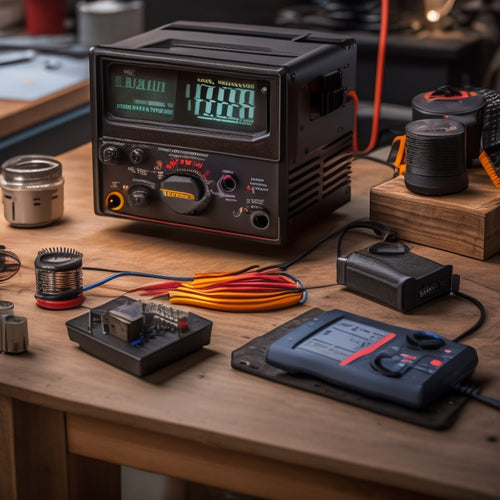Why Monitor Your Home Energy Usage
Share
By monitoring your home energy usage, you can identify energy-wasting appliances, optimize your usage patterns, and reduce monthly bills. You'll reveal opportunities to trim your utility costs, reduce your carbon footprint, and even safeguard your home's security. Regular energy audits help identify major energy wasters, and analyzing consumption patterns reveals trends for reduction. You can optimize your energy usage by employing energy-efficient appliances, scheduling usage during off-peak hours, and tracking consumption in real-time. As you investigate the benefits of monitoring your home energy usage, you'll find more ways to take control of your energy consumption and create a more sustainable, cost-effective, and secure living space.
Overview
- Monitoring home energy usage helps identify energy-wasting appliances and habits, reducing energy consumption and costs.
- It provides insights into energy usage patterns, enabling optimization and habit adjustments for increased energy independence.
- Regular monitoring can reduce monthly energy bills by identifying opportunities for savings through efficient appliance use and thermostat adjustments.
- Monitoring energy usage pinpoints areas of inefficiency, allowing for targeted improvements to home energy efficiency and reduced waste.
- It enhances home energy security by detecting potential system vulnerabilities and preventing unauthorized access to energy data.
Identify Energy-Wasting Appliances
Among the numerous devices plugged into your home's electrical grid, some appliances are silently draining power even when not in use, contributing considerably to your energy waste.
These energy vampires can be found throughout your smart home, from TVs and computers to kitchen gadgets and phone chargers. Conducting regular energy audits helps you identify which devices are the biggest energy wasters.
To optimize your energy usage, it's crucial to analyze your energy consumption patterns and create a detailed breakdown of energy usage to identify trends and develop strategies to reduce energy waste.
By pinpointing these appliances, you can take steps to reduce standby power consumption, such as unplugging them when not in use or using power strips to cut power completely.
Optimize Energy Usage Patterns
Pinpointing energy-wasting appliances is just the first step; now it's time to optimize your energy usage patterns to maximize your savings. By analyzing your energy usage data, you can identify opportunities to adjust your daily habits and routines.
To further reduce energy consumption, consider employing energy-efficient appliances, such as low-wattage refrigerators, and LED lighting, which can make a considerable impact on your overall energy usage. Implementing energy management strategies, such as scheduling appliance usage during off-peak hours, can greatly reduce your energy consumption.
Employ usage tracking technologies to gain real-time observations into your energy usage, allowing you to make informed decisions about your energy consumption. By optimizing your energy usage patterns, you'll be well on your way to achieving energy independence and reducing your reliance on the grid.
Reduce Monthly Energy Bills
Your wallet will thank you when you reduce your monthly energy bills. By implementing energy saving tips and budget friendly strategies, you can cut down on unnecessary expenses and allocate your hard-earned money towards more important things. Here's a breakdown of how you can reduce your energy bills:
| Energy Saving Tips | Budget Friendly Strategies | Monthly Savings |
|---|---|---|
| Turn off lights during the day | Replace incandescent bulbs with LEDs | $10-$20 |
| Unplug appliances when not in use | Use power strips to plug in electronics | $15-$30 |
| Adjust thermostat settings | Install a smart thermostat | $20-$40 |
| Upgrade to energy-efficient appliances | Look for appliances with the ENERGY STAR label | $30-$50 |
| Conduct an energy audit | Identify areas of energy inefficiency in your home | $50-$100 |
Improve Home Energy Efficiency
By reducing your monthly energy bills, you've taken the first step towards creating a more sustainable and cost-effective living space.
Now, it's time to focus on improving your home's energy efficiency. Conducting an energy audit will help identify areas where energy is being wasted, allowing you to make targeted improvements.
Consider investing in energy efficient smart thermostats that can track energy usage and optimize temperature control. Additionally, investigate sustainable insulation options like recycled denim or natural wool to minimize heat loss.
Consider investing in smart home technology, such as smart thermostats and energy monitors, to gain real-time knowledge into your energy usage. These tools can help you optimize your energy consumption, reducing waste and saving you even more money.
Enhance Home Energy Security
Enhancing home energy security is essential to preventing unauthorized access to your energy usage data and protecting your home from potential cyber threats.
You need to guarantee that your smart technology, such as smart meters and energy management systems, are secure and up-to-date. Conducting regular energy audits can help identify vulnerabilities in your system.
By doing so, you can prevent hackers from accessing your energy usage data, which can be used to gather sensitive information about your daily habits and routines.
Furthermore, securing your energy system can prevent potential cyber attacks that can compromise your home's safety and security.
Frequently Asked Questions
How Does Energy Monitoring Impact My Home's Resale Value?
You enhance your home's resale value by showcasing energy efficiency through monitoring, making it a smart investment that attracts eco-conscious buyers and increases your property's appeal, giving you more freedom to sell at a premium price.
Can Energy Monitoring Systems Integrate With Existing Smart Home Devices?
Are you tired of juggling multiple smart devices? You can seamlessly integrate energy monitoring systems with your existing devices, unblocking energy saving tips and streamlining your smart home experience.
Are Energy Monitoring Devices Compatible With All Types of Electrical Panels?
You'll find that most energy monitoring devices are compatible with standard electrical panels, but some may require additional hardware or installation knowledge, ensuring energy efficiency and cost savings without compromising your freedom to choose.
Can I Monitor Energy Usage Remotely Through Mobile Apps?
You can track, analyze, and optimize your home's energy usage from anywhere, at any time, with remote access to real-time monitoring through mobile apps, giving you complete control and flexibility to manage your energy consumption on-the-go.
Do Energy Monitoring Systems Comply With Data Privacy Regulations?
You'll find that reputable energy monitoring systems comply with data privacy regulations, ensuring your data security through strong measures like encryption and secure servers, while also obtaining your explicit user consent before collecting and processing your energy usage data.
Ready to Buy
By monitoring your home energy usage, you'll gain expertise in mindful management, making your abode a model of efficiency. Identify idle appliances, optimize your usage patterns, and pare down your pricey bills. Improve your home's energy efficiency and enhance its security. Stay savvy, save energy, and shrink your carbon footprint.
Related Posts
-

Top Portable Refrigerators for Camping Adventures
When you're camping, having a reliable portable refrigerator can make all the difference for keeping your food fresh ...
-

Why Outdoor Solar Lighting Systems Are Sustainable
Outdoor solar lighting systems are sustainable because they utilize renewable energy, drastically reducing your carbo...
-

Key Features of a DC to AC Converter
A DC to AC converter features high efficiency and conversion rates, which reduce energy costs and improve performance...


